Richard Konkolski - Knihy Konkolski s.r.o.
|
| DOMŮ |
|
|
FILMY-DVD | TV VYSTOUPENÍ | ROZHLAS | ČLÁNKY | SEDM MOŘÍ | SÓLO SAILING |
|
|
|
|
||
Newport 1980!It was nice sunny day. I just finished my third solo transatlantic race - The OSTAR 1980. Some of my Newport friends boarded my boat right after I crossed the finish line and the rest gave me a very warm welcome at the dock of the Goat Island Marina.
I finished ninth overall on second class monohull boat. I even beat Tabarly's hydrofoil trimaran "Paul Ricard" and I felt great. The easterly wind during the first week of the race unbeatably favored light multihulls and it showed. All the multihulls were the first six boats to finish. With my recent time I would have won all previous solo transatlantic races, but now it was good just to get a fourth place in my class. Despite that, my spirit was high and I was ready for another challenge or adventure. My four year long period of hard preparation for this race ended and it was time for something more demanding than the solo Trans-Atlantic crossing. New challenge crossed my path even before I was able to get US entry clearance. Just as I was passing through the door to the marina office to call for customs, I was transfixed by the blue poster right behind the glass door announcing Solo Around the World Race - Around Alone!
Soon I founded myself in the nearby Marina Pub with James Roos and David White discussing the new, first of its kind, race. Up to now, there was only one single-handed race around the world - The Globe Challenge in 1968. But it was nonstop circumnavigation competition. This time Around Alone would have four legs. David White come up with the idea for this race. He was going to compete in OSTAR 1980, for which he built a First Class boat with the maximum length of 56 feet. But he did not complete the construction of his boat on time and missed the entry. Building and launching his boat in Rhode Island, he ended up in Goat Island Marina where he met James Roos.
James Roos was general manager of the Goat Island. He liked David's idea. With the support of the Goat Island owner, he could offer free marina space and services for the start and the finish of the race. The race was taking shape. Now they only needed the competitors and the money to run it all or at the very least, trophies for the winners. That's where I came in. I was very interested in the race and I could easily supply a trophy. Being from Czechoslovakia, a country known for beautiful crystal, I could promise to provide a superb crystal trophy. Four years ago, during the OSTAR 1976, I secured over two feet high crystal vase for City of Newport for its 200 year anniversary as United States. Such trophy would make the race a serious competition. To be honest I must admit, that before the start of OSTAR 1980 at Plymouth, fellow competitor American Jerry Cartwright announced "Clipper Race". This race should have been 17,000 miles long competition from Newport to San Francisco around the furious Cape Horn. At that time that race was more attractive to me. I already had under my belt a solo circumnavigation on 24ft long boat and I did not need another. But I did not yet rounded Cape Horn. Also, the Clipper Race would follow the track of famous clippers from the time of golden fever, when thousands of fortune seekers followed this track and the "golden time" spirit was still alive to make this race more attractive to me. Also the maximum size of boats was set to 44 feet and I was just on top of it with a great opportunity to win.
Unfortunately, Jerry had a serious car accident from which he never fully recovered. The car crash crashed the Clipper Race for about 15 years before others could pick up on Jerry's idea and turn it into reality. For me the unfortunate accident made it easy to make a commitment to go for the Alone Around Race and give my word to James Roos to be on the starting line in 1982. After the OSTAR 1980 I spent two month at Newport and near Warwick. During that time I met a few more times with James, David and others in the pub or on my boat. All discussions were about the new race and before I left for Europe, the basic race requirements were almost set. The race should happen in 1982, only two years after the OSTAR 1980. This did not give to much time for preparation. Two biggest boat classes from OSTAR were accepted for this race with overall limit of 56 feet for the first class and 44 feet for the second. The race should start and finish at Newport with stops at Cape Town, Sydney and Rio de Janeiro. I had no objection to this as I had a 44 foot boat specially designed for OSTAR 1980 and therefore would be at the top of second class. David White had the top boat for the first class. He was going to enter the race as a competitor and got very busy with his own preparation. Therefore, he left the organization of the race solely on James Roos, who was able to surround himself with a great group of people who put theirs souls into the running of this race.
Two years latter, when in 1982 I come to Newport for the start, the situation was different. As I promised, I come with the trophy. It was not crystal vase but equally if not more valuable "ship's bell." I had to defect from Czechoslovakia to be able to take part in the race and crystal was too brittle to sneak it over the well-guarded borders. So I came with a solid, specially casted ship's bell. The bell was designed by the artist Ladislav Safarik as a globe with countries and racetrack on the outside surface of the bell. It was cast in the part of Czechoslovakia, where the bell casting was a family tradition and the secret knowledge of it had been inherited from father to son for four hundred years. These bohemians could make any bell of any shape at any desired tone.
I could proudly pass this "art trophy" to James Ross at my arrival to Newport. In reality, he did not need my trophy any more because they were able to get a sponsor for the race, but they could not resist the trophy and they announced additional conditions to win this one.
During the time of preparation for the race, Englishman Richard Broadhead was in search of sponsorship. He approached unsuccessfully hundreds of companies. He almost got the BOC - British Oxygen Company, to sponsor him, but by the end, the company management decided it would rather sponsor the whole race than individual competitor. This way the Around Alone got the needed sponsorship and a new name - "BOC Challenge."
Copyright 1998 Richard Konkolski |
Richard@Konkolski.com / Mobil: +420 601 541 344 |
|||||||||||||||||||

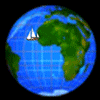
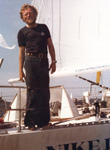 Crossing the finish line of OSTAR 1980
Crossing the finish line of OSTAR 1980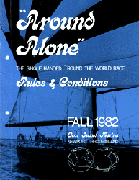 Poster announcing the first "Around
Alone"
Poster announcing the first "Around
Alone"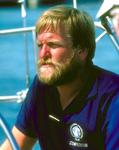 David White
David White James Roos
James Roos Jerry Cartwright
Jerry Cartwright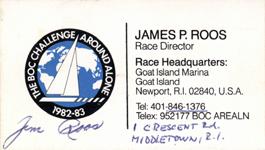
 The Bell Trophy
The Bell Trophy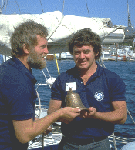 Presenting the "Bell Trophy" to the race director James Roos
Presenting the "Bell Trophy" to the race director James Roos Richard Broadhead
Richard Broadhead